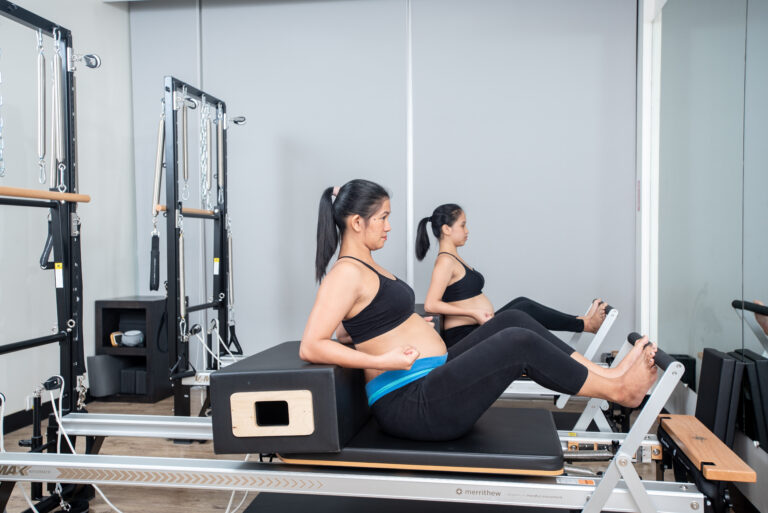Is Prenatal Pilates a Game-Changer for Moms-to-Be?
Pregnancy is a transformative journey that brings immense joy and profound changes to a woman’s body. From conception to childbirth, the body undergoes significant physical, hormonal, and emotional shifts. Maintaining physical activity during this period is crucial for both the mother and the baby. Among the various forms of exercise, Pilates stands out as a gentle yet effective practice that caters to the unique needs of mothers-to-be.
Integrating Pilates into your routine during pregnancy can provide numerous benefits, including improved core strength, enhanced posture, reduced discomfort, and better overall well-being.

Understanding the Prenatal Stage
The prenatal stage, spanning from conception to childbirth, is a period of profound transformation. As the baby grows, the mother’s body adapts to accommodate these changes, often leading to discomforts such as back pain, pelvic instability, and postural imbalances.
Exercise during pregnancy is not only safe but also encouraged, provided it is done under proper guidance.
Benefits of Prenatal Pilates
Pilates, a low-impact exercise method, is particularly beneficial during pregnancy. Its focus on controlled movements, breathing, and core engagement makes it an ideal choice for expecting mothers. Here’s how prenatal Pilates supports women throughout pregnancy:
1. Strengthens Core and Pelvic Floor Muscles
As the baby grows, the added weight puts pressure on the pelvic floor muscles. Pilates strengthens these muscles, reducing the likelihood of incontinence and supporting an easier delivery.
2. Reduces Back and Joint Pain
Pregnancy often shifts the body’s center of gravity, leading to postural changes and discomfort. Pilates helps maintain spinal alignment, reducing lower back pain and joint stress.
3. Enhances Breathing and Relaxation
Focused breathing techniques in Pilates prepare mothers for labor by promoting relaxation, reducing anxiety, and improving oxygen flow for both the mother and baby.
4. Improves Circulation and Reduces Swelling
Gentle movements in Pilates promote blood circulation, minimizing swelling and preventing conditions like varicose veins.
5. Encourages Mind-Body Connection
Pregnancy can be overwhelming both physically and emotionally. Pilates enhances mindfulness, helping mothers-to-be connect with their changing bodies and their growing baby.
6. Boosts Energy and Prevents Fatigue
While pregnancy can bring bouts of fatigue, controlled movements in Pilates help maintain energy levels, keeping mothers active and engaged.
Safe Practices and Considerations
While Pilates is generally safe for pregnant women, it’s essential to follow these guidelines to ensure a positive experience:
1. Consult Your Doctor – Always seek medical clearance before starting or continuing any exercise program during pregnancy.
2. Work with a Certified Instructor – A professional trained in prenatal Pilates can provide appropriate modifications and guidance.
3. Listen to Your Body – Pregnancy is unique to each woman. If any movement causes discomfort, it’s important to stop and adjust accordingly.
4. Avoid Certain Movements – Exercises that involve lying flat on the back for extended periods, deep twists, or high-impact movements should be modified to accommodate pregnancy.
5. Stay Hydrated and Take Breaks – The body’s hydration needs increase during pregnancy. Regular water intake and breaks are essential.
6. Focus on Breathing and Alignment – Controlled breathing and proper alignment maximize the benefits of each movement while minimizing strain.
Getting Started with Prenatal Pilates
If you’re new to Pilates or looking for a structured program during pregnancy, consider these steps:
Join a Prenatal Pilates Class – Many studios and online platforms offer specialized classes for expectant mothers. Halcyon Fitness provides tailored prenatal Pilates sessions designed to support and strengthen the body through each stage of pregnancy.
Create a Consistent Routine – Aim for at least two to three sessions per week, adjusting intensity as needed.
Incorporate Daily Movement – Simple Pilates-inspired stretches and breathing exercises can be practiced at home for additional benefits.
Invest in Proper Equipment – A comfortable mat, resistance bands, and a stability ball can enhance your practice.

The journey through pregnancy is unique to every mother. Incorporating Pilates into this phase provides a gentle yet effective way to support the body’s changes, enhance overall well-being, and ease the transition to childbirth. With its focus on strength, flexibility, and mindfulness, Pilates is a valuable practice that empowers women to embrace their prenatal experience with confidence and grace.
By prioritizing movement, breathwork, and self-care, mothers-to-be can enjoy a healthier pregnancy and a strong foundation for labor and delivery. Whether you are expecting your first child or navigating the later stages of pregnancy, Pilates can be a trusted companion in your journey to a balanced and resilient body.
For those looking for expert guidance, Halcyon Fitness offers specialized prenatal Pilates sessions to help mothers-to-be feel strong, supported, and prepared for their journey into motherhood.

